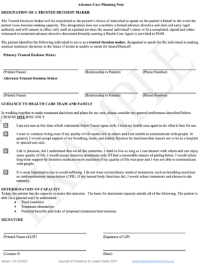Trusted Decision Maker

At most Providence locations, patients who can make their own decisions
can now tell their doctor who they trust to make decisions for them. The
doctor will write this down in your electronic health record.
Talking about a trusted decision maker can help you complete a legal advance
directive. A trusted decision maker note is not a legal document and does
not replace state laws. However, having a trusted decision maker in your
file can be very important for your doctor and family.
Providence policy encourages all adult patients and caregivers to have
an advance directive on file.
Note: The image on the right is just for demonstration.
Advance Care Planning
Start the conversation about how we care for each other.
 Advance care planning is about making decisions for the care you want if
you can't speak for yourself. It's about your loved ones and caregivers
respecting your care wishes based on your values, goals, and preferences
if you become seriously ill or have an accident.
Advance care planning is about making decisions for the care you want if
you can't speak for yourself. It's about your loved ones and caregivers
respecting your care wishes based on your values, goals, and preferences
if you become seriously ill or have an accident.
Thinking and talking about advance care planning can be hard, but you and
your family don't have to do it alone.
To get started, follow these four easy steps:
-
-
-
-